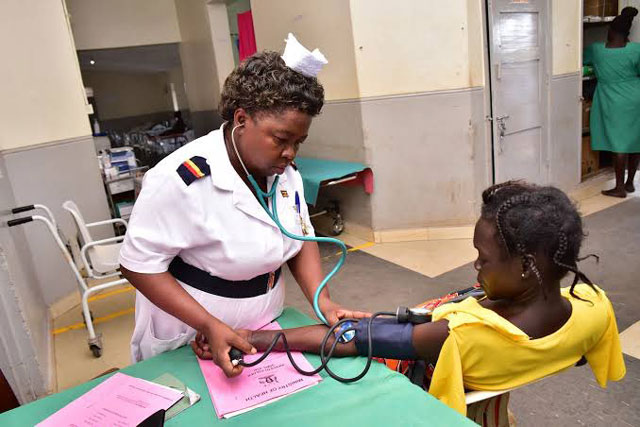
Blood pressure can be regulated through:
🥗 Balanced diet
🧂 Limit consumption of salt
🏃🏼 Exercise daily for 30 mins
👨🏾⚕️ Go for regular checkups
Kampala, Uganda | ISAAC KHISA | AstraZeneca, a global science-led biopharmaceutical company that focuses on the discovery, development, and commercialization of prescription medicines, primarily for the treatment of diseases in three main therapy areas – Oncology, Cardiovascular & Metabolic Diseases, and Respiratory, will roll out its Healthy Heart Africa (HHA) programme in Uganda following signing of a Memorandum of Understanding (MoU) with the Ministry of Health.
The programme, which is also being implemented in Kenya, Ethiopia, Tanzania and Ghana, aims to strengthen the provision of services for managing and preventing hypertension also known as High Blood Pressure (HBP), including raising awareness of lifestyle risk factors for cardiovascular disease (CVD), using Ministry of Health guidelines to standardise care and up skilling health workers through training and education.
Ashling Mulvaney, Head of Access to Healthcare, Global Sustainability at AstraZeneca, said they are delighted to partner with the ministry to support the government’s goal of tackling non-communicable diseases, which are a growing public health issue countrywide.
“Through Healthy Heart Africa, we will be able to identify barriers that hinder access to hypertension care and work together to strengthen the healthcare system by addressing the prevention, awareness and diagnosis of hypertension, as well as the education and training of health workers,” she said.
“Our experience since the first HHA programme was implemented has given us insight and learnings that will help us to implement a successful programme in Uganda together.”
This development comes as the globe celebrates the World Hypertension Day (WHD), which is always held on May 17 every year.
The Healthy Heart Africa programme will help identify barriers that hinder access to hypertension care and work together to strengthen the healthcare system
First inaugurated in May 2005, the WHD seeks to promote public awareness of hypertension and to encourage citizens of all countries to prevent and control this silent killer, the modern epidemic.
Statistics from World Health Organisation shows that hypertension is estimated to cause 7.5 million deaths, about 12.8% of the total of all deaths globally.
Back in Uganda, the national STEPwise survey conducted in 2014 showed that 24.3 percent of Ugandans had elevated blood pressure, while the pre-hypertension rate was at 37 percent.
The study also showed that over 70 percent of the respondents had never had their blood pressure measured and that 76.1 percent of those with raised blood pressure were untreated.
Only 7.7 percent of participants with hypertension were aware of their high blood pressure, suggesting a high burden of undiagnosed and uncontrolled hypertension in the region.
However, in Sub-Saharan Africa, nearly 30 percent of adults were estimated to have high blood pressure in 2014, the highest prevalence in any region.
Commenting on the development, Dr Diana Atwine Kanzira, Permanent Secretary, Ministry of Health said the Ministry, under the leadership of President Yoweri Museveni, shall continue to spearhead programmes that equip the country’s healthcare system with the tools, resources, knowledge and trained personnel required to tackle both communicable and non-communicable diseases.
“We are therefore excited to unveil this partnership with AstraZeneca to implement the Healthy Heart Africa programme, which will contribute to our government’s objective of reversing the high prevalence of hypertension in our country,” she said.
Healthy Heart Africa programme partners with global and local partners with the aim of sustainably improving access to hypertension care by increasing education and awareness around lifestyle choice and CVD risk factors; training healthcare providers and driving care to lower levels of the healthcare system, such as primary healthcare facilities and clinics, as well as facilitating access to treatment where appropriate.
Since launching in Kenya in 2014 and subsequently expanding to Ethiopia in 2016, Tanzania in 2018, and Ghana in 2019, HHA has conducted over 14.5 million blood pressure screenings in the community and in healthcare facilities as well as trained more than 7,200 healthcare workers, including doctors, nurses, community health volunteers and pharmacists to provide education and awareness, screening and treatment.
The programme has also active 780 healthcare facilities in Africa to provide hypertension services and identified more than 2.6 million people with elevated blood pressure.
 The Independent Uganda: You get the Truth we Pay the Price
The Independent Uganda: You get the Truth we Pay the Price


